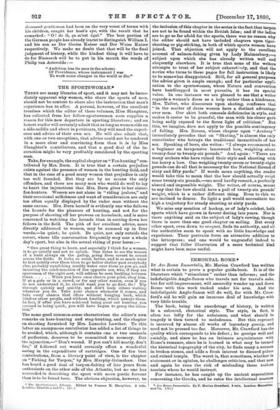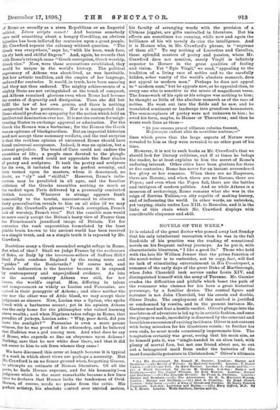IMMORTAL ROME.*
IN Ave Roma Immortalis, Mr. Marion Crawford has written what is certain to prove a popular guide-book. It is of the literature which " stimulates " rather than informs ; and the indefatigable Anglo-Saxon who travels not for travel's sake, but for self-improvement, will assuredly wander up and down Rome with this work tucked under his arm. And the indefatigable Anglo-Saxon will do well, for with Mr. Craw. ford's aid he will gain an immense deal of knowledge with very little trouble.
The book, being the anecdotage of history, is written in a coloured, rhetorical style. The style, in fact, is often too lofty for the substance, and what should be tragedy is then turned to melodrama. But this reproach is incurred by almost all works of legendary gossip, and need not be pressed too far. Moreover, Mr. Crawford has the quality which corresponds to his defect ; he gossips well and amiably, and since he has an intimate acquaintance with Rome's romance, since he is learned in what may be termed the historical topography of the city, he finds many a sermon in broken stones, and adds a fresh interest to disused palace and ruined temple. The worst is, that sometimes, whether in statement or in opinion, he challenges criticism, and that now and again he runs the risk of misleading those zealous tourists whom he would instruct.
For instance, he has caught up the ancient superstition concerning the Greeks, and he rates the intellectual masters
• The Epertsteoninn'e Library. Edited by Frances E, Slaughter, 2 vole. • Ave Erma Intmortalis. By F. Marion Crawford. 2 vols. London: Maolnillon of Rome as soundly as a stern Republican or an Imperial satirist. Litera scripta manet ! And because somebody once said something about a hungry Greekling, an obvious injustice has been inflicted for centuries upon a great people. Dir. Crawford repeats the calumny without question. " The Greek was everywhere," says he, "with his keen, weak face, his sly look and skilful fingers." And, again, he records that with Rome's triumph came " Greek corruption, Greek worship, Greek vice." Now, were these accusations established, they would be unique in the world's history. The political supremacy of Athens was short-lived, as was inevitable. But her artistic tradition, and the empire of her language, endured for centuries. It would, in truth, have been amazing had they not thus endured. The mighty achievements of a mighty State are not extinguished at the touch of conquest, and Athens remained glorious even when Rome had become the centre of depravity and dissipation. Thus she did but fulfil the law of her own genius, and there is nothing unexpected in her persistence. Nor is it unexpected that Rome should profess no sympathy for the nation which held an intellectual domination over her. It is not the custom for neigh- bouring States to exchange approval or admiration. For the Greek the Roman was a barbarian ; for the Roman the Greek was an epitome of blackguardism. But an impartial historian need not accept these summary verdicts, and the real surprise is that the reckless opinion of untutored Rome should have found universal acceptance. Indeed, it was no opinion, but a natural prejudice. The brood of Cato could not endure the amenities of life ; a people once devoted to the plough- share and the sword could not appreciate the finer shades of poetry and sculpture. It took the poetry and sculpture for its own, it imitated the arts in perfect serenity, and then turned upon its masters, whom it denounced, no doubt, as " sly " and " skilful." However, Rome's indis- cretion may be paralleled in all ages, and the familiar criticism of the Greeks resembles nothing so much as the verdict upon Paris delivered by a personally conducted British tourist. Whatever is strange appears frank immorality to the tourist, unaccustomed to observe. A. hasty generalisation reveals to him on all sides (if we may parody Mr. Crawford's phrase) "French corruption, French lack of worship, French vice." Bat the sensible man would no more easily accept the Briton's hasty view of France than the Frenchman's jaundiced image of Britain. Yet for centuries the rank superstition formulated by the least pliable brain known to the ancient world has been received as a simple truth, and as a simple truth it is repeated by Mr. Crawford.
Doubtless many a Greek scoundrel sought refuge in Rome. But what of that ? Shall we judge France by the souteneurs of Soho, or Italy by the ice-cream-sellers of Saffron Hill Shall Paris condemn England by the racing touts and " guides" of the Boulevards P Of course not, and Rome's indiscretion is the heavier because it is exposed by contemporary and unprejudiced evidence. As late as the second century Athens was still, for her lovers, the world's capital. Men, differing in talent and temperament as widely as Lucian and Pausanias, are agreed in their panegyric of Athens ; and since neither the one nor the other was of Attic blood, we may accept their judgment as sincere. Now, Lucian was a Syrian, who spoke Greek with a barbarous accent ; yet in his opinion Athens was the only home for the philosopher who valued learning above wealth ; and when Nigrinns takes refuge in Rome, that paradise of jockeys, Lucian asks : " Why, poor devil, did you leave the sunlight? " Pausanias is even a more potent witness, for be was proud of his citizenship, and he believed that Hadrian was a god among men. And what does he say of Rome, who expends so fine an eloquence upon Athens ? Nothing, save that he saw white deer there, and that it did not occur to him to ask from whence they came I We have discussed this error at length because it is typical of a work in which short views are perhaps a necessity. But Mr. Crawford is on no firmer ground when, forgetting Greece, be attempts an estimate of Roman literature. Of all the poets, he finds Horace supreme, and for his humanity !—a judgment which is the more remarkable because a few lines later he declares that Horace lacks the tenderness of Ovid. Horace, of course, needs no praise from the critic. His perfect artistry, his absolute control over untried metres, his faculty of arranging words with the precision of a Chinese juggler, are gifts unrivalled in literature. But his effects are sometimes too cunning, while now and again the brilliance of his wit merely dazzles the intelligence. And it is Horace who, in Mr. Crawford's phrase, is "supreme of them all." To say nothing of Lucretius and Catullus, those splendid masters of poetry and passion, whom Mr. Crawford does not mention, surely Virgil is infinitely superior to Horace in the great qualities of feeling and vision. Yet "Epic Virgil," we read, "appealing to the tradition of a living race of nobles and to the carefully hidden, sober vanity of the world's absolute monarch, does not appeal to modern man." Perhaps he does not appeal to " modern man," but he appeals now, as he appealed then, to every one who is sensitive to the music of magnificent verse. The framework of his epic or his eclogue was nothing to him; he thought as little of the absolute monarch as of the race of nobles. He went out into the fields and he saw, and he translated sentiment or landscape into grandiose hexameters. The commonplaces of poetry were not unknown to him ; he owed his form, maybe, to Homer or Theocritus; and then he wrote such lines as these- " Et jam summa procul villarum culmina fumant,
Majoresque cadunt altis de montibus umbrae,—" lines which prove that the large aspects of Nature were revealed to him as they were revealed to no other poet of his time.
However, it is not to such books as Mr. Crawford's that we should look for literary criticism, and if at times be befogs the reader, he at least explains to him the secret of Rome's enduring interest. Other cities have been glorious for three or five centuries ; Rome has never for an instant surrendered her glory or her romance. When there are no Emperors, there are Barons ; and when there are no Barons, there are Popes ; and even when the Popes fail, there are the battles and intrigues of modern politics. And so while Athens is a museum of archaeology, Rome remains what she was in the reign of Serving Tullius,—a city capable of making history, and of influencing the world. In other words, an unbroken, yet varying, chain unites Leo XIII. to Romulus, and it is the links of this chain which Mr. Crawford displays with considerable eloquence and skill.











































 Previous page
Previous page